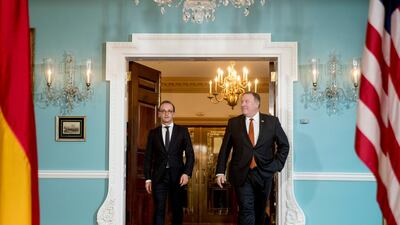It is just not Iran that needs to be worried about the implications of the uncompromising speech made by Mike Pompeo, the recently appointed US Secretary of State, about Washington’s future approach to dealing with the ayatollahs.
A number of key European states, too, will now be looking over their shoulders to see if their own cosy relationship with Tehran will put them on a collision course with the Trump administration, thereby provoking a potentially damaging transatlantic rift.
As one of the more hawkish members of the Trump administration's foreign policy establishment, Mr Pompeo's hard-hitting speech on Iran should not have come as a surprise to anyone who has followed the career of this former US Army officer.
Having spent most of the 1990s serving in many of the world’s trouble-spots, Mr Pompeo is well-acquainted with the main threats to the US and its allies. As a consequence, he has a long history of making robust statements against Iran’s pernicious and growing influence in the Middle East.
During his previous tenure as CIA Director, Mr Pompeo was a frequent visitor to Saudi Arabia, where he gave explicit warnings about Iran’s continued meddling in Yemen, Iraq and Syria. He even wrote a letter to Qassem Soleimani, the head of the Revolutionary Guard elite Quds force, warning him that the US would hold him responsible for any attacks by Iran against America and its allies.
Now, in his first key-note speech on Iran since taking up his post at the State Department, Mr Pompeo has delivered arguably the most uncompromising statement on Washington's position towards Tehran in the long and troubled recent history of the two countries, which dates back to the 1979 Iranian revolution and the American embassy hostage crisis.
In his speech, which was made at Washington’s Heritage Foundation, the flag-bearer of the Republican right, Mr Pompeo threw down the gauntlet to the ayatollahs, demanding that they undertake a radical change in their behaviour or face the consequences by having the most punitive sanctions regime ever imposed on them.
His demands included the insistence that Iran end all nuclear enrichment programmes, including the closure of its heavy water reactor which, Mr Pompeo argued, it did not have the right to operate under the terms of the nuclear deal.
There was also a direct appeal to the Iranian people, whom he said were prisoners of their past, and suggested that they should reject the hardline theocracy the ayatollahs created in the immediate aftermath of the Iranian revolution.
“What has the Iranian revolution given to the Iranian people?” Mr Pompeo asked at one point, before answering the question thus: “The hard grip of repression is all that millions of Iranians have ever known.”
Nor were the Trump administration’s long-standing grievances about the failings of the nuclear deal negotiated by former US President Barack Obama the only issues he raised.
Mr Pompeo wants Iran to radically change its support for groups like Hezbollah and Hamas, which Washington regards as terror organisations, as well as ending its military support for the Houthi rebels in Yemen who are seeking to overthrow the country’s democratically-elected government.
He also demanded that Tehran withdraw all its forces from Syria, where the Iranian Revolutionary Guard Corps has taken advantage of the country's long-running civil war to establish an elaborate network of permanent military bases.
“You know, the list is pretty long,” Mr Pompeo concluded, before adding: “We didn’t create the list. They did.”
If Iran’s immediate response to Mr Pompeo’s speech is anything to go by, the prospects of the regime in Tehran conceding to any of these demands is pretty remote, not least because they go against one of the central tenets of the Iranian constitution drawn up by Ayatollah Ruhollah Khomeini – to export the principles of the Iranian revolution throughout the Muslim world.
Iran responded to Mr Pompeo’s speech by describing it as the type of American arrogance and bullying behaviour that has alienated other nations, not just the Iranians.
“Who are you to decide for Iran and the world?” President Hassan Rouhani said in remarks quoted on Iranian state media.
The only rational conclusion, therefore, to be drawn from Mr Pompeo’s speech is that it is going to set Washington on a new collision course with Tehran, one that will lead to a significant increase in tensions between the two countries.
And Washington's new, uncompromising approach is also likely to cause some serious soul-searching among a number of America's key allies in Europe, who have adopted a far more nuanced approach to the Iran issue.
This was evident in the frantic bout of European diplomacy that preceded US President Donald Trump’s announcement that he was withdrawing from the Iran deal, with prominent figures such as British Foreign Secretary Boris Johnson flying to Washington to make a direct appeal to the president, courtesy of Fox News, to stick with the arrangement.
One of the primary reasons for European disquiet is the significant trade links a number of major European countries, such as France, Germany and Italy, have built up with Tehran since the nuclear deal was signed in 2015.
Companies such as the European aircraft consortium Airbus and the French oil giant Total have all negotiated lucrative contracts with the Iranians as part of commercial re-engagement between Iran and the outside world that was encouraged by the Obama administration.
Continuing with these deals, though, could put a number of major European companies in conflict with the US, which has threatened to impose sanctions against companies that trade with Iran, as well as Iran itself.
But with Mr Pompeo seemingly in no mood to compromise, stating that “every country is going to have to participate”, the Europeans now find themselves facing a difficult dilemma.
Either they embrace Washington’s new no-nonsense approach to Iran, or they suffer the consequences.
Con Coughlin is the Daily Telegraph’s defence and foreign affairs editor and author of Khomeini’s Ghost


